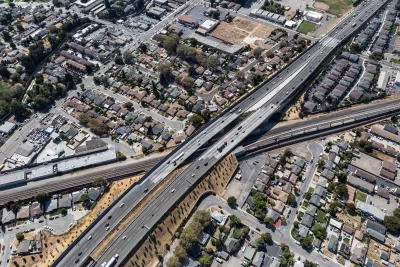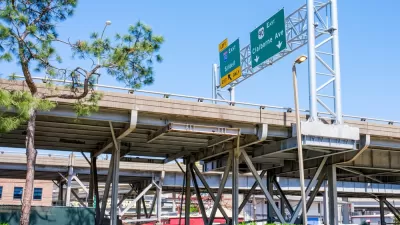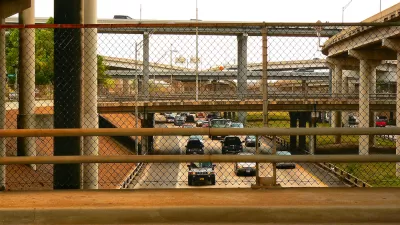The Biden administration has pledged to correct the damage imposed on communities by highways and infrastructure, but many projects are only committing to minor improvements, not transformative changes.

Recognizing the impacts of rampant highway construction and other infrastructure on urban neighborhoods and communities of color, the Reconnecting Communities Act and other recently created federal programs aim to redress the damage. Writing in The New York Times, Mark Walker describes the Biden administration’s efforts “to address racial disparities resulting from how the United States built physical infrastructure in past decades.”
As Walker explains, “The Transportation Department has awarded funding to dozens of projects under the goal of reconnecting communities, including $185 million in grants as part of a pilot program created by the $1 trillion bipartisan infrastructure law.” But “Once you wreck a community, putting it back together is much more work than just removing an interstate,” says Transportation for America director Beth Osborne.
Walker describes one such effort in Kansas City, where $5 million in federal funding is fueling planning for pedestrian overpasses and transit infrastructure to improve conditions around U.S. Highway 71, which “displaced thousands of residents and cut off predominantly Black neighborhoods from grocery stores, health care and jobs.” The city doesn’t envision removing the highway altogether, but rather adding connections to safely link the neighborhoods on either side.
FULL STORY: Highways Have Sliced Through City After City. Can the U.S. Undo the Damage?

Planetizen Federal Action Tracker
A weekly monitor of how Trump’s orders and actions are impacting planners and planning in America.

Maui's Vacation Rental Debate Turns Ugly
Verbal attacks, misinformation campaigns and fistfights plague a high-stakes debate to convert thousands of vacation rentals into long-term housing.

Restaurant Patios Were a Pandemic Win — Why Were They so Hard to Keep?
Social distancing requirements and changes in travel patterns prompted cities to pilot new uses for street and sidewalk space. Then it got complicated.

In California Battle of Housing vs. Environment, Housing Just Won
A new state law significantly limits the power of CEQA, an environmental review law that served as a powerful tool for blocking new development.

Boulder Eliminates Parking Minimums Citywide
Officials estimate the cost of building a single underground parking space at up to $100,000.

Orange County, Florida Adopts Largest US “Sprawl Repair” Code
The ‘Orange Code’ seeks to rectify decades of sprawl-inducing, car-oriented development.
Urban Design for Planners 1: Software Tools
This six-course series explores essential urban design concepts using open source software and equips planners with the tools they need to participate fully in the urban design process.
Planning for Universal Design
Learn the tools for implementing Universal Design in planning regulations.
Heyer Gruel & Associates PA
JM Goldson LLC
Custer County Colorado
City of Camden Redevelopment Agency
City of Astoria
Transportation Research & Education Center (TREC) at Portland State University
Jefferson Parish Government
Camden Redevelopment Agency
City of Claremont





























